Where Do Birds Go When It Rains?
Where Do Birds Go When It Rains? Can Birds Sense Storms?
Humans tend to take cover when it rains, but what about the birds? Where do birds go when it rains? How do they protect themselves? Do they continue to fly as usual? We look at some of these questions…
This really depends on how heavy the rains are and what species of bird it is.
Different birds go to different places, while others simply brave the weather as long as it’s just light rain.
For instance, nesting birds or land birds that have a crevice in a tree or somewhere where it is dry will go to the same place every night while it’s raining.
Others might hide behind a tree to block out some of the wind and rain and hence preserve their body heat. Others hide in bushes, under shrubs, or anywhere where there might be a way of getting less wet.
Depending on how hard it’s raining, they may just choose to continue as if nothing is happening.
Some birds love to just play in the puddles that form or take the opportunity to bathe themselves happily singing as if it were a beautiful day.
Or they can look for worms or other edible critters that come out during the rains due to the ground becoming saturated with water.
Oftentimes you’ll see smaller birds just standing in the rain fluffing up their feathers to keep warm and burying their beaks close to their breasts.
Or in stronger winds, they’ll point their beaks to the wind and stand like little sentinels on guard.
They might also start pruning themselves which is actually how they add natural waterproofing oil to their feathers.
They’ll pull the oil from oil glands located at the base of their tails and systematically spread the oil to each feather using their beak.
And waterfowl like ducks and swans will keep swimming around in search of creatures to eat as if the rain isn’t even there.
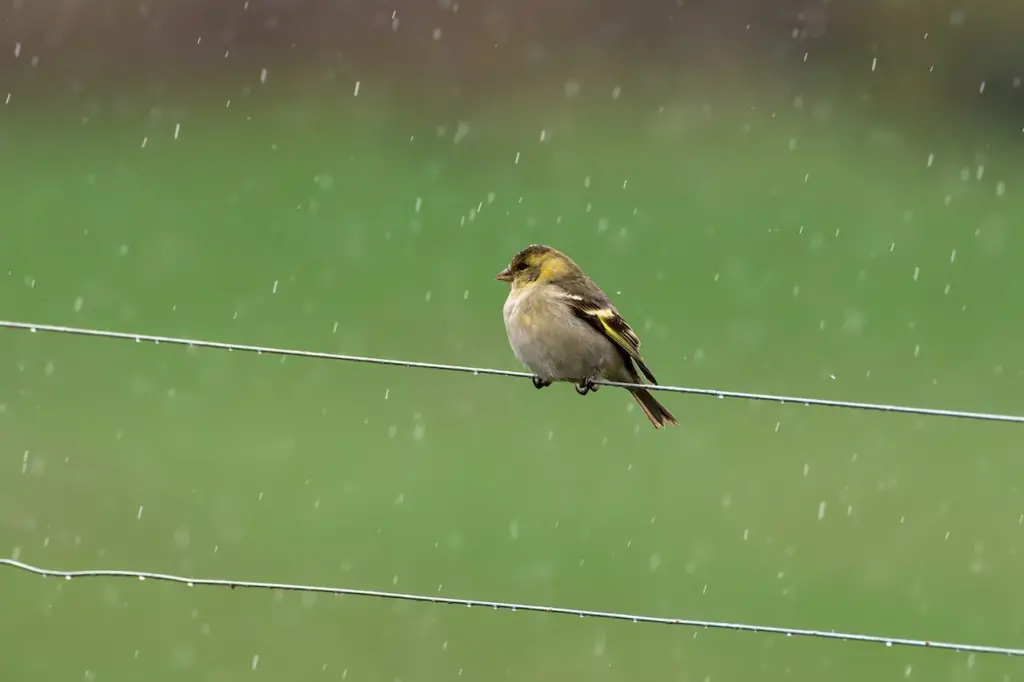
What Do Birds Do When There’s a Storm?
During heavy downpours or extreme weather, birds will often do all they can to protect themselves from getting wet.
They’ll hide under brush, in thickets, tree branches, or even a birdhouse if you have one in your yard.
This is because most birds, although they have waterproof feathers, can become waterlogged if too much water is absorbed into their downy layer that is usually protected by pockets of air keeping them warm.
These air pockets can become saturated leaving them susceptible to cold temperatures. This is very dangerous, especially for smaller birds that can die of hypothermia very quickly.
The biggest problem for most birds isn’t just the severity of the storm, but how long the storm lasts.
For smaller birds like hummingbirds and finches, long periods of stormy weather can be disastrous since these birds need to continually eat to survive or face starvation in as little as a day or two.
Sooner or later they must brave the weather in search of food sources regardless of how hard it’s raining.
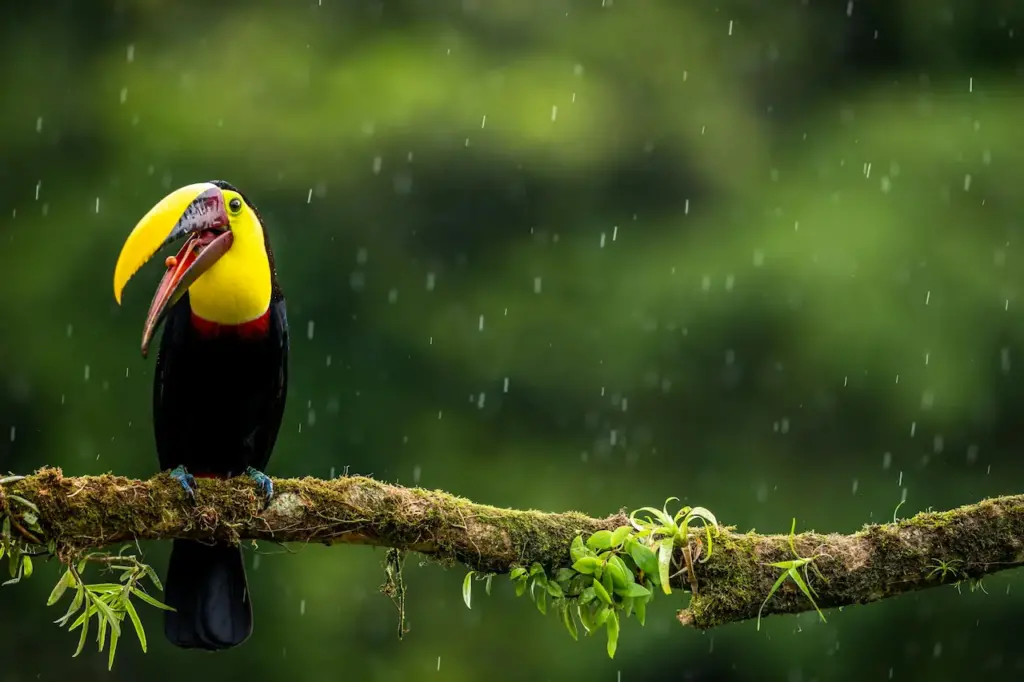
Can Birds Fly During a Storm?
During a storm, birds have a lot of trouble trying to fly, and it’s not due to the wind and rain.
Rather, low atmospheric pressure causes air to become less dense, making it more difficult for the birds to fly.
You can think about it like this. Try floating in the ocean versus a normal pool of water.
The saltwater in the ocean is more dense than regular water, therefore it is easier for you to float in saltwater. And you don’t use as much energy to float in salt water as you would need in freshwater.
It’s basically the same for a bird. When the air is less dense, it’s more difficult for birds to fly or even soar.
And when they must fly due to hunger or for safety, they use up a lot more energy to fly the same distances as they normally would if the air were denser.
During a storm that can last several days, this extra calorie burn use could literally be the difference between life and death for some birds.
So while they can fly during a storm, most birds will try not to in order to conserve calories needed to stay healthy and warm.
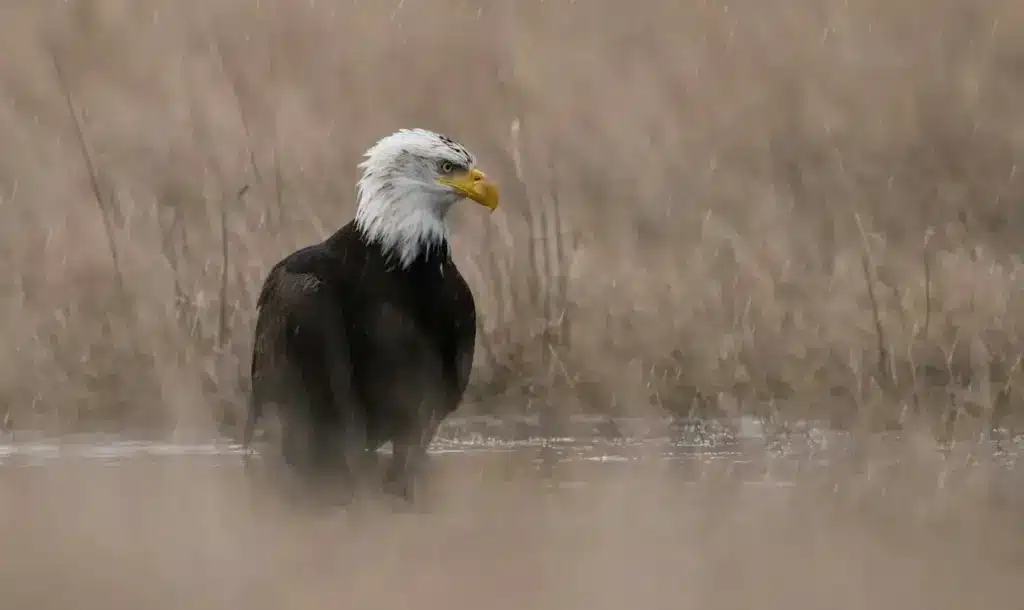
Can Birds Fly With Wet Wings?
Yes, they can, but it stresses them out when they need to.
Scientific research on White-ruffed Manakins (Corapipo Altera) conducted in Costa Rica showed that even in the rainforest, heavy rains stressed out birds enough for them to seek out the drier ground.
This came as a surprise to the researchers who took blood samples and found higher stress hormones in the birds after a ten-day storm.
They also found that the birds were using up fat reserves showing they couldn’t find enough to eat during the storms.
This in turn forced the smaller birds that needed to continuously eat or face starvation to move on to drier grounds in search of food.
So while it was possible for the birds to fly during these storms, it wasn’t what they wanted to do. And the storms caused them a lot of stress obviously related to the lack of food.
Do Birds Know When a Storm Is Coming?
Yes, birds can tell when a storm is coming and there is now scientific data to back it up.
One of the most compelling scientific discoveries supporting the idea that birds can predict the weather came in 2014 completely by mistake.
A team from the University of California was studying the migration patterns of the golden-winged warbler (Vermivora chrysoptera) through the use of geo-locators attached to some of the birds.
After returning from Columbia to nest in their natural habitat in the Appalachian Mountains region of North America just days before a 5,000 km flight, the birds suddenly flew the coup only two days after arriving.
Unknown to the researchers at the time, a massive storm hit the same area two days later unleashing violent storms and tornadoes that killed 35 people and devastated the eastern Tennessee area where the birds nest.
The birds knew what was coming ahead of time and flew over 900 miles south to avoid the storms only to return once again 5 days after they were over.
These birds clearly knew that a bad storm was coming and took clear action to evade the storm.
How they knew days before is still being debated, but thanks to this research and others, science is getting more involved in answering these exact questions.
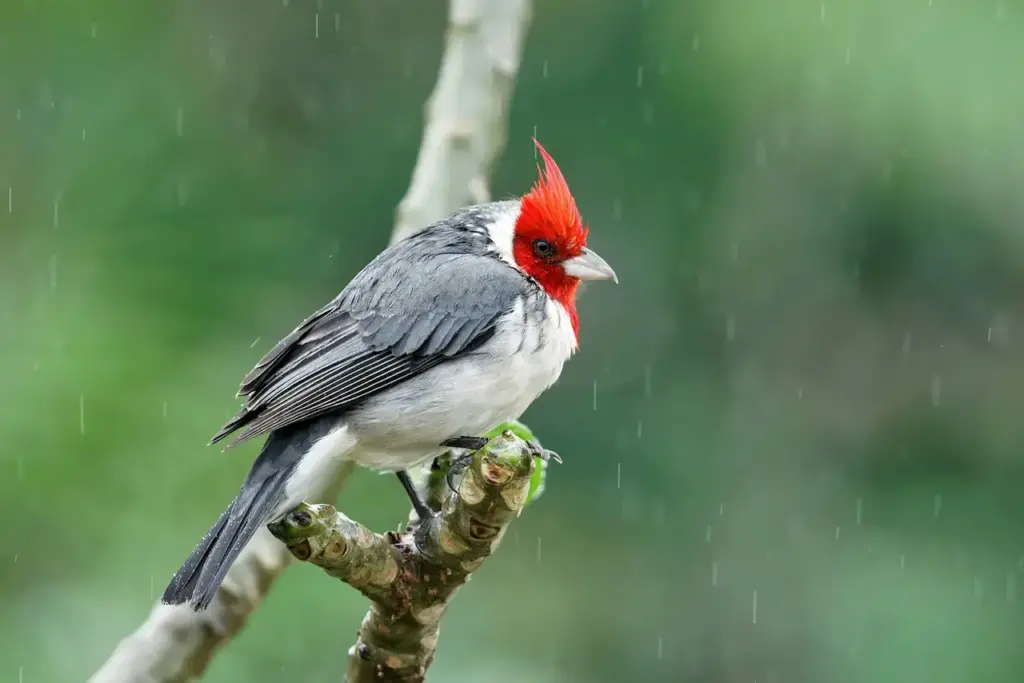
Bird Behavior Before a Storm
Humans have probably been looking to nature for signs of weather since we were smart enough to take notice. And even with all of the new technological advances at our disposal, it seems we should still be paying attention.
So how can we tell if a storm is coming by looking at the birds in our backyards?
This takes us back to birds not wanting to fly during storms due to the air becoming less dense. And it isn’t just the birds that are affected by the drop in air pressure.
Insects and other flying creatures are also going to be affected. So if your birds are flying uncharacteristically low while chasing insects, this could be a tell-tale sign the air pressure is dropping, and therefore a storm is possible.
Some other telling bird behavior is when there are a lot more birds than usual in your yard. They are gathering in trees and along bush lines to weather the approaching storm.
And when they get eerily quiet, that’s also a sign bad weather is imminent. And it’s time to grab your umbrella.
Wrapping Up
People have looked to bird behavior and nature in general for clues as to what the weather held, even months in advance. From how bad winter would be, to when impending storms were on the horizon.
And although birds may not be as cool as the app on your phone for letting you know your weekly weather, that doesn’t mean you shouldn’t be paying attention to them.
Not only can they alert you to coming rain storms, but they can also give warnings of potential disasters like tornadoes and heavy electrical storms on the horizon.
So it seems our grandparents and great-grandparents were on to something with all their little rhymes and proverbs about birds and weather.
The weather is for the birds!

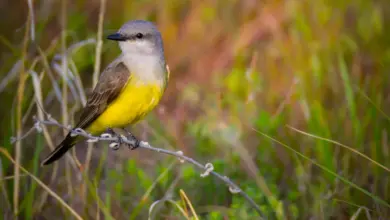

Hi. Nice article, thank you. Just a small correction – sea water is MORE dense than fresh water. Good luck with the space yacht! All the best
We appreciate your feedback, thank you very much Daivd. This is now revised.